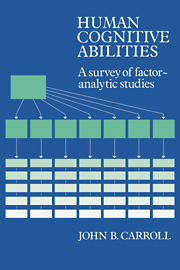Book contents
- Frontmatter
- Contents
- Preface
- PART I INTRODUCTION TO THE SURVEY
- PART II THE IDENTIFICATION AND DESCRIPTION OF COGNITIVE ABILITIES
- Chapter 5 Abilities in the Domain of Language
- Chapter 6 Abilities in the Domain of Reasoning
- Chapter 7 Abilities in the Domain of Memory and Learning
- Chapter 8 Abilities in the Domain of Visual Perception
- Chapter 9 Abilities in the Domain of Auditory Reception
- Chapter 10 Abilities in the Domain of Idea Production
- Chapter 11 Abilities in the Domain of Cognitive Speed
- Chapter 12 Abilities in the Domain of Knowledge and Achievement
- Chapter 13 Psychomotor Abilities
- Chapter 14 Miscellaneous Domains of Ability and Personal Characteristics
- Chapter 15 Higher-Order Factors of Cognitive Ability
- PART III ISSUES
- References and List of Datasets
- Appendix A Codes for Countries, Samples, and Factors
- Appendix B Hierarchical Factor Matrix Files
- Name Index
- Subject Index
Chapter 5 - Abilities in the Domain of Language
Published online by Cambridge University Press: 29 September 2009
- Frontmatter
- Contents
- Preface
- PART I INTRODUCTION TO THE SURVEY
- PART II THE IDENTIFICATION AND DESCRIPTION OF COGNITIVE ABILITIES
- Chapter 5 Abilities in the Domain of Language
- Chapter 6 Abilities in the Domain of Reasoning
- Chapter 7 Abilities in the Domain of Memory and Learning
- Chapter 8 Abilities in the Domain of Visual Perception
- Chapter 9 Abilities in the Domain of Auditory Reception
- Chapter 10 Abilities in the Domain of Idea Production
- Chapter 11 Abilities in the Domain of Cognitive Speed
- Chapter 12 Abilities in the Domain of Knowledge and Achievement
- Chapter 13 Psychomotor Abilities
- Chapter 14 Miscellaneous Domains of Ability and Personal Characteristics
- Chapter 15 Higher-Order Factors of Cognitive Ability
- PART III ISSUES
- References and List of Datasets
- Appendix A Codes for Countries, Samples, and Factors
- Appendix B Hierarchical Factor Matrix Files
- Name Index
- Subject Index
Summary
… language acquisition and reading ability may indeed be regarded as basic; they enhance potential in the sense of capability to learn.
Israel Scheffler (1985)This survey of “primary” or first-order factors of cognitive ability found in the factor-analytic literature begins by considering factors interpreted as lying in the broad domain of language. The line between this domain and many others, such as that of reasoning, is difficult to draw. Many factors appear to depend on both language abilities and other abilities, such as reasoning and memory. I consider here the factors that appear to draw more on language abilities than other abilities. Furthermore, the tests loaded on any of a great many factors presuppose the subject's knowledge of his or her native language, either in its spoken form or – much more frequently – in its written, printed form, either in understanding instructions for these tests or in actually responding to the tasks presented in the tests. This very fact complicates the interpretation of any intercorrelations among factors and of any higher-order factors that are isolated in the analysis of test batteries (see Chapter 15). But it also justifies the consideration of factors in the language domain before all others, because it leads to establishing a kind of baseline for the consideration of those other factors.
Even the language domain itself is complex, for as this chapter shows, there are many different aspects of knowing and using a language.
- Type
- Chapter
- Information
- Human Cognitive AbilitiesA Survey of Factor-Analytic Studies, pp. 145 - 195Publisher: Cambridge University PressPrint publication year: 1993
- 1
- Cited by



